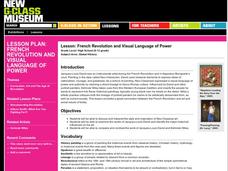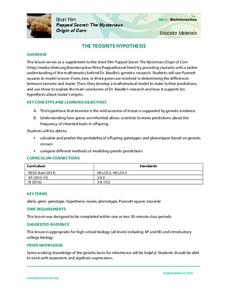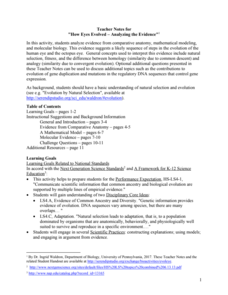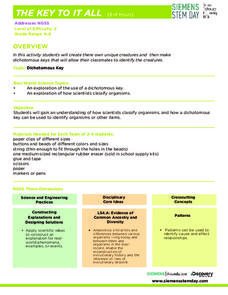Curated OER
Collective Poetry: Teaching Tolerance
Help your class create collective poetry following a simple, engaging model from Teaching Tolerance (tolerance.org). Each young poet writes five things on an index card: sayings from others, favorite sound, favorite place, favorite...
New Class Museum
Lesson: French Revolution and Visual Language of Power
Take a look at the French Revolution and neo-classic art, then compare it to current social issues and contemporary art. Kids analyze several pieces painted by Jacques-Louis David in regard to style and subject then compare them to...
Curated OER
Lesson: Tlatelolco: Mexican Student Massacre 1968
The Massacre of Tlatelolco is the focus of a discussion-based instructional activity. Civil-minded learners consider the nature of student movements that have ended in violence based on over-reaction and government oppression. They...
Curated OER
Immigration
This 3-day immigration study draws on historical trends and current events. A worksheet accompanies initial research on one group's U.S. immigration history, giving opportunity for collaborative learning through sharing findings. Groups...
Curated OER
Traditional African Society
Engaging your class in African culture and traditions, this presentation provides photographs, historical contexts, and societal structures from different African tribes. It poses discussion topics about the benefits and disadvantages of...
Curated OER
Grapes of Wrath: Setting up Historical Context
Discuss life in the 1930s in relation to the Dust Bowl and Great Depression, then do a cross-media analysis. Here you'll find background information on film maker John Ford, writer John Steinbeck, and 1930s America. You can compare the...
Alabama Department of Archives and History
Camp Aliceville: The Story of WWII Prisoners of War Who Came to Alabama
POW camps in the United states? In Alabama? The German POW camp in Aliceville, Alabama is used as the focus of a study of the more than 700 camps built in the US during World War II.
National Geographic
Genetic Markers: Connecting the Dots
Biology buffs simulate how genetic markers are passed among populations in order to understand how these markers can help anthropologists map human migration. A couple of volunteers leave the room while you walk the remaining learners...
Lincoln-Sudbury Regional High School
WWII Position Paper
There are some historical events that may warrant greater reflection and more in-depth analysis, and the decision to intern Japanese-Americans in the United States during World War II, as well as to drop the atomic bomb on Hiroshima and...
Art Institute of Chicago
African Myths and Stories
Young historians discover African stories associated with a royal altar tusk from the Kingdom of Benin in Nigeria, read myths illustrated on the tusk, and write a story about the life of an oba using figures depicted on the tusk.
Hawthorn Academy
Guided Reading Before, During and After Activities
There's more to reading than just reading! Help your kids get the most out of a text by setting up guided reading activities and providing worksheets. This resource includes ideas for activities to complete before, during, and after...
College of New Rochelle
Latin Worksheet: Horace, Ode 1.5
Take a look at Horace's "Ode 1.5" from Carmina in depth with an analysis activity. Included on the first page is the original Latin version of the verses as well as a literal translation. Pupils respond to questions relating to sounds,...
McGraw Hill
Arthropods
Are spiders related to crabs? Study the order of arthropods with a reading selection about animal diversity. It provides details about each class within the order, as well as vivid pictures and explanatory charts.
Civil War Trust
Genealogy
The Civil War is undoubtedly a part of America's history, but could it be part of your pupils' history as well? Middle schoolers conduct research to discover a connection between their ancestors and the American Civil War. Whether they...
Reed Novel Studies
Hatchet
A brief introductory presentation illustrates many images from Gary Paulsen's Hatchet. From berries to black bears, young readers take a quick trip through Alaska during a class reading unit.
Big Kid Science
Eclipse Classroom Activities: Cultural Significance Project
What better way to celebrate eclipses than across cultures? Explore myths of solar and lunar eclipses from ancient cultures like the Chinese, Ancient Greek, Mesoamerican, Incan, Egyptian, Ancient Babylonian, and Middle Eastern. Learners...
Channel Islands Film
Island Rotation: Lesson Plan 4
Foster's Rule? Allopatric speciation? After watching West of the West's documentary Island Rotation, class members use Venn diagrams to compare endemic species on the Channel Islands with mainland related species. They then create a...
Prestwick House
Vocabulary Activity Sheet
What does it mean to stream a program? How do you know if you're watching a mash-up? If you don't know these words, reach for your handy Merriam-Webster dictionary, because they're there! A series of fill-in-the-blank questions prompt...
Howard Hughes Medical Institute
Stalking the Genetic Basis of a Trait
Need an a-maize-ing lesson to show your class how regulatory genes work? If you use the well-written resource, they'll be all ears! Biology scholars discover the gene responsible for the evolution of the modern-day corn plant through a...
Howard Hughes Medical Institute
The Teosinte Hypothesis
Don't want to sound corny, but your class will be a-maize-d by an engaging activity! Explore the history of the modern corn plant through a video and Punnett squares. Junior genetics experts get hands-on experience with actual research...
Serendip
How Eyes Evolved – Analyzing the Evidence
Octopodes existed for hundreds of thousands of years before humans, yet our eyes share many similarities. Scholars analyze the evidence to determine if the evolution of eyes best fits a homology or analogy model. They discuss the issue...
Discovery Education
The Key to It All
Which characteristics make organisms unique? Dichotomous keys simplify the process of classifying organisms by focusing on these unique characteristics. Young scholars learn how to use the dichotomous key flow chart by creating their own...
Diane Venzera
Kwanzaa Celebration: Celebrating Family, Community, and Culture
Kwanzaa is the focus of a three-part lesson that celebrates the history and traditions of the holiday. Before lighting the Kinara, scholars listen to a read-aloud of Seven Candles of Kwanzaa by Andrea Davis Pinkney. Learners express...
Learning Games Lab
Bacteria Sampling
Scholars explore the procedure for bacteria sampling in a virtual lab by first walking through a detailed step-by-step procedure of preparing the samples of raw milk and pasteurized milk, growing the bacteria, and comparing results....
Other popular searches
- Common Ancestry
- Ancestry Research
- Tracing Ancestry
- Researching Ancestry
- Family Ancestry
- Guyana and Ancestry
- Guyana Ancestry
- Ancestry Gr 2
- Evolution Common Ancestry
- Multicultural Ancestry
- Dna Technology "Ancestry
- Dna Technology "Ancestry"

























